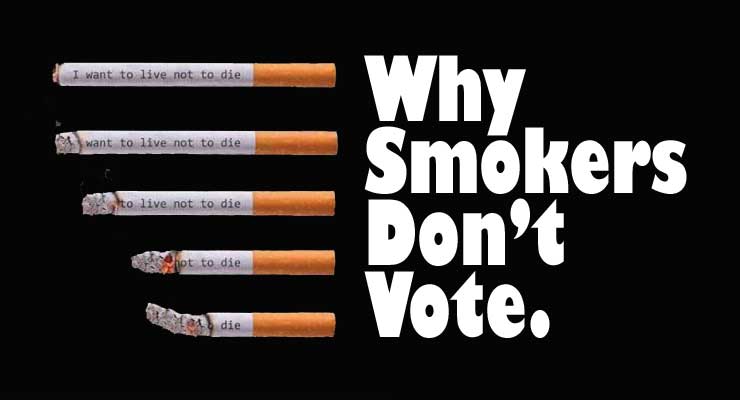
Unique Colorado study finds that tobacco smokers vote less frequently but reasons are still murky | Democracy, elections and voting at Democracy Chronicles
A University of Colorado Cancer Center study published in the journal Nicotine & Tobacco Research shows a new dimension to the marginalization of smokers: people who smoke are less likely to vote than their non-smoking peers.
“One on hand, the result is intuitive. We know from previous research that smokers are an increasingly marginalized population, involved in fewer organizations and activities and with less interpersonal trust than nonsmokers. But what our research suggests is that this marginalization may also extend beyond the interpersonal level to attitudes toward political systems and institutions,” says Karen Albright, PhD, assistant professor at the Colorado School of Public Health, and the paper’s first author.
The data comes from the Colorado Tobacco Attitudes and Behaviors Study (C-TABS), a questionnaire administered by Arnold Levinson, PhD, investigator at the CU Cancer Center, director of the University Health Smoking Cessation Program, and the paper’s senior author.
Through random digit dialing, the study reached 11,626 people who completed a telephone survey querying a range of demographic, social, and behavioral factors. Questions included smoking behaviors and whether the respondent had voted in a recent election. Overall, 17 percent of respondents were smokers. Holding all other variables constant (included variables of socioeconomic status that were strongly associated with smoking), daily smokers were 60 percent less likely to vote than nonsmokers.
The study is the first to link a health-risk behavior with electoral participation, building on the work of a previous Swedish study that found an association between smoking and political mistrust. Voting is a direct behavioral measure of civic and political engagement that at least partly reflects trust in formal political institutions.
But Albright points out that, like many studies that use statistics to describe the behaviors of a population, the current study creates as many questions as it answers, most notably why smokers are less likely to vote. One possibility is that smokers may view political institutions as oppressors, given widespread enactment of tobacco taxes and clean indoor air laws. Somewhat similarly, the stigma associated with smoking may create social withdrawal or feelings of depression or fatalism among smokers, which could decrease voting.
Albright, Levinson, and colleagues are in the process of analyzing another more recent set of C-TABS data, after which Albright hopes to explore smokers’ feelings toward the political system more qualitatively. “We’re getting a clearer picture of the ‘what’ and soon I hope it will be time to talk to individual smokers in these populations to start exploring the ‘why’,” Albright says.
Story Source:
The above post is reprinted from materials provided by University of Colorado Denver. Note: Materials may be edited for content and length. “Smokers don’t vote: 11,626-person study shows marginalization of tobacco users.” ScienceDaily. ScienceDaily, 19 May 2015.
Journal Reference:
K. Albright, N. Hood, M. Ma, A. H. Levinson. Smoking and (Not) Voting: The Negative Relationship Between a Health-Risk Behavior and Political Participation in Colorado. Nicotine & Tobacco Research, 2015; DOI: 10.1093/ntr/ntv098
Leave a Reply